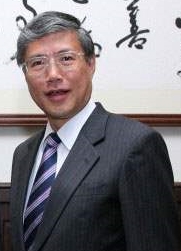Richard Koo
Richard C. Koo | |
|---|---|
 | |
| Personal details | |
| Born | 1954 Kobe, Japan[1] |
| Spouse(s) | Chyen-Mei |
| Children | 2 |
Richard C. Koo (Japanese: リチャード・クー, IPA: [ɾitɕaːdo kɯː]; Chinese: 辜朝明; pinyin: Gū Cháomíng; born 1954) is a Taiwanese-American economist living in Japan specializing in balance sheet recessions. He is Chief Economist at the Nomura Research Institute.[2][3]
Early life and education[]
Koo was born in Kobe. His father, Koo Kwang-ming, was an activist in the Taiwan independence movement then living in exile in Japan, and the brother of the prominent Taiwanese businessman Koo Chen-fu.[4] Koo lived in Tokyo for 13 years in his youth, and later attended the University of California, Berkeley where he received a BA degree in Political Science and Government in 1976.[1] He then proceeded to Johns Hopkins University for graduate school, where he received an MA degree in 1981.[1]
Career[]
Upon graduation from Johns Hopkins University, Koo worked at the Federal Reserve Bank of New York as an economist from 1981 to 1984.[1]
He then joined Nomura[clarification needed] in 1984 as its first expatriate researcher - first as senior economist from 1984 to 1997.[5][6][1] He later became the chief economist at Nomura Research Institute starting in 1997.[1]
Landon Thomas wrote about Koo's analysis in late 2011 in the New York Times, saying that Koo's 2011 "causes, cure, and politics" publication "has gone viral on the Web". Thomas was discussing the divergence between the way the U.S. and British governments addressed their banking crises in the 2008-9 financial crisis and the way Europe was beginning to in late 2011.[7]
Publications[]
- (2008) The Holy Grail of Macroeconomics - Lessons from Japan’s Great Recession (John Wiley & Sons)
- (2011) "The world in balance sheet recession: causes, cure, and politics", Real-World Economics Review (issue no. 58), Nomura Research Institute, Tokyo.
- (2014) The Escape from Balance Sheet Recession and the QE Trap: A Hazardous Road for the World Economy (John Wiley & Sons)
References[]
- ^ Jump up to: a b c d e f "Richard Koo's Linkedin Profile". Retrieved 29 May 2016.
- ^ "Desperate Measures". New Republic. 2010-10-29. Retrieved 2017-03-21.
- ^ "Richard Koo's Awesome Presentation On The Real Reason Why This Recession Is Completely Different". Business Insider. Retrieved 2017-03-21.
- ^ "蔡総統、リチャード・クー氏と経済・金融政策で意見交換 - エキサイトニュース" (in Japanese). Retrieved 2017-03-21.
- ^ "未来創発センター | 野村総合研究所(NRI)". www.nri.com (in Japanese). Retrieved 2017-03-22.
- ^ "「バブル後日本 世界が今学ぶ」リチャード・クー氏". www.nikkei.com (in Japanese). Retrieved 2017-03-21.
- ^ Thomas, Landon, Jr., "Banks Retrench in Europe While Keeping Up Appearances" (limited no-charge access), The New York Times, December 22, 2011. Retrieved 2011-12-22.
External links[]
Some of Koo's videos and links are below:
Links[]
Videos[]
- Video: Richard Koo explains what is wrong with the economy, April 9, 2011 on YouTube
- Richard Koo: Overhangs, Uncertainty and Political Order: Where Do We Go From Here? on YouTube at the Institute for New Economic Thinking's (INET) Paradigm Lost Conference in Berlin. April 14, 2012
- Video: ACATIS Konferenz 2016, Mr. Koo, Surviving in the Intellectually Bankrupt Monetary Policy Environment on YouTube
- Living people
- 1954 births
- Taiwanese people of Hoklo descent
- Hokkien businesspeople
- American people of Chinese descent
- American expatriates in Japan
- Koo family of Lukang
- Institute for New Economic Thinking
- Johns Hopkins University alumni
- University of California, Berkeley alumni
- Japanese economists
- 21st-century American economists
- Federal Reserve economists
- Nomura Holdings
- Economist stubs